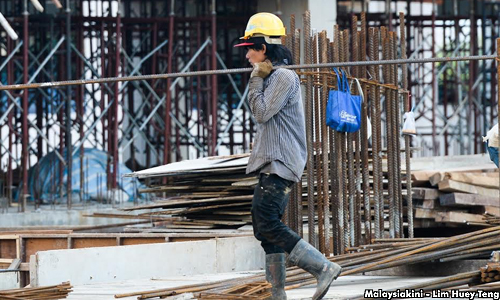
A relative’s house, recently renovated, was burgled. My first suspects – an inside job, the contract migrant workers. Who else would know the unsecured sections and layout of the house?
News reports of rising crime and alarmist anecdotes of home invasions in the gated community reinforced my suspicion. That was an uncomfortable thought stemming from an underlying bias against migrant workers.
I may think I’m a rational being who understands the logic of his actions and thoughts. But when it comes to reacting to perceived differences in other groups, much of what I think and say is often done without much thought.
I gravitate towards negative narratives. I pigeonhole and relate to others by the labels I unconsciously tag on 'them'. I am implicitly biased. I am a bigot. Are you? (you can find out for yourself with Harvard University’s Implicit Association Test).
My implicit bias could easily fester into overt bigotry – unless I consciously listen to the personal stories of the migrant workers as individuals compelled to leave their family for higher paid work in other countries. It’s that simple – listen first before judging.
As Pope Francis said of the US President Donald Trump before they met in the Vatican, “I never judge someone before I listen to the person. I can't do that...we will talk and things will come up…I will tell him what I think, he will tell me what he thinks, but I never wanted to judge someone before I listen to the person first."
With the divisive racial politics in Malaysia, we could do a lot better if we listen to and engage more with each other. For a while, we listened and came together during the MH370 and MH17 tragedies. We reached out to social media. But when it came to competing for a fairer share of a diminishing economic pie, race and religion inevitably determine where we stand in the queue.
A random read of social media comments on national issues shows how fixated we are on racial differentiation and discrimination. Nobel Laureate in economic sciences and psychologist, Daniel Kahneman, in 'Thinking, Fast and Slow', notes that our brain is habitually “primed to find flaws” in whatever and whomever we encounter.
In a laboratory experiment, Kahneman observes, “the brains of humans and other animals contain a mechanism that is designed to give priority to bad news…the brain responds quickly even to purely symbolic threats. Emotionally loaded words quickly attract attention, and bad words (war, crime, race) attract attention faster than do happy words (peace, love, harmony).” Which partly explains the tone of media reporting of race issues.
We are getting bolder
Whether our racial narratives have become worse is hard to say, without reliable empirical studies. What is clear is that we are getting bolder, and less accountable, in anonymously releasing our pent-up angst on social media, even as special interest groups and political incumbents publicly spew their racist rhetoric with impunity. This, despite the fact that we share certain core values and goals for our family, community and country.
The fact is, biases and prejudices are learned from childhood, as the IAT implies in its thousands of test results compiled over the decades. There is no other institution as conducive as the home and school environments to inculcate cross-cultural literacy and a global mindset in the young ones. That day in Malaysia will come when the explicit race-based policies could be replaced by a renewal of mindsets and cultural empathy. The first step is to rant less and listen more.
Listening is simple – but not easy. The capacity for empathetic listening can only emerge from within a culturally literate home environment, a liberal education system, diversity training in the private and public sectors, and an inclusive political agenda. Without the capacity to listen and engage beyond race and religion, we have little hope of moving forward.
The media, vernacular newspapers and news portals can do more by exercising informed judgment and contextual framing in their reporting. Do not give prominence to racist rhetoric by politically motivated sources. Expose the sources for their whistleblowing and the implicit racism they harbour.
Journalists should be more mindful of being misled in their reportage by the right-wing mob’s malformed racist and Islamist ideology, sexual discrimination, special rights, and so on.
Media coverage ought to make it clear that the identity politics propagated with impunity by right-wing groups may just turn us into a dysfunctional state.
Nobel laureate Amartya Sen in his book 'Identity and Violence' in cautioning the Hindus and Muslims in India on the illusions of identity politics said: “A sense of identity can be a source not merely of pride and joy, but also of strength and confidence…And yet identity can also kill – and kill with abandon.”
ERIC LOO is Senior Fellow (Journalism) at the School of the Arts, English & Media, Faculty of Law Humanities & Arts, University of Wollongong, Australia. He is founding editor of 'Asia Pacific Media Educator'. Email: eloo@uow.edu.au. -Mkini


No comments:
Post a Comment
Note: Only a member of this blog may post a comment.